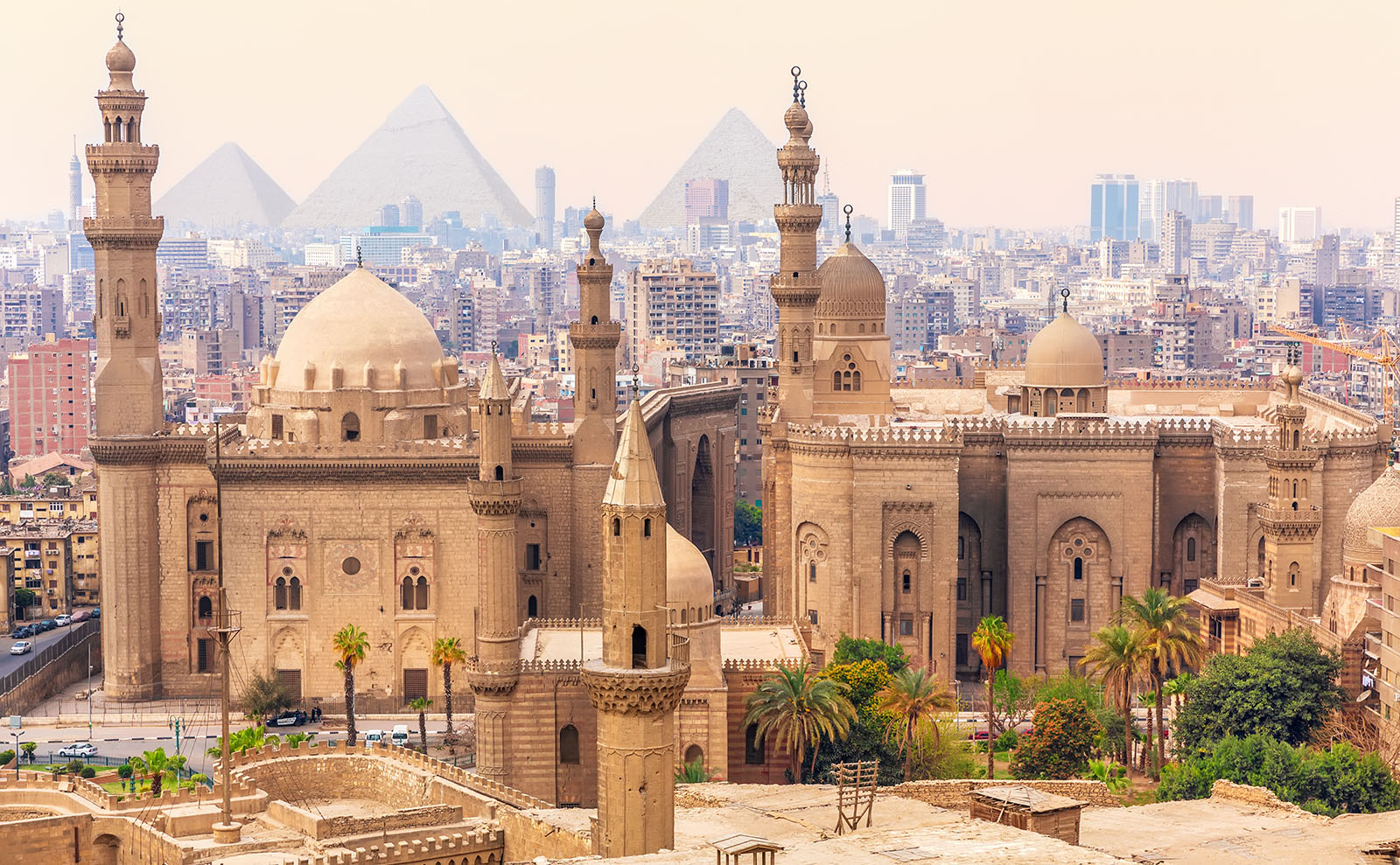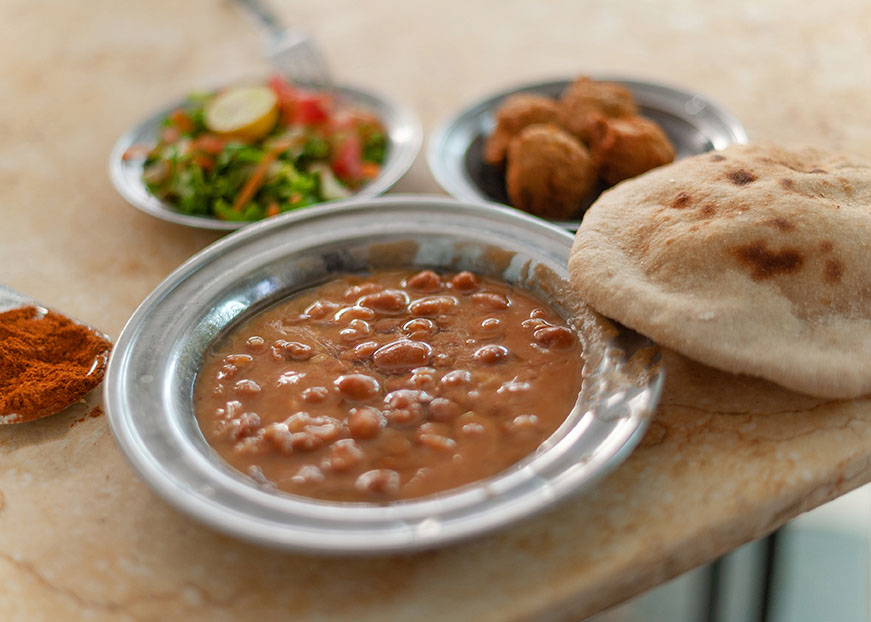
Armchair travel around the world!
Start your reading adventures with our FREE Reading Atlas.

- Around the World in 14 Books
- 7 Thrilling Book Series
- 6 Audiobooks That Are Like Theater For Your Ears



Food and drinks are some of the easiest ways — and the most fun— to vicariously experience another culture. When you add a great book to the mix, you've got the makings of a perfect evening. In Food+Fiction, we recommend a delicious read and a related recipe so you can try the taste of different destinations in your own kitchen.
This post is part of our Food+Fiction series.

According to lore, ful medames — the traditional Egyptian meal of cumin-infused fava beans with pita bread, fresh herbs, and boiled eggs on the side — has been the winning way to start the day since the time of the pharaohs.
It’s sometimes foul mudammas or ful madammes or ful medames, but it’s almost always breakfast. Super popular in Cairo and Giza, but eaten throughout the country, ful medames is a savory, hearty dish to help you get your bearings on the day, preferably accompanied by a lovely cup of strong tea.
That’s just what Ali al-Raqb does in the enchanting novel The Last Watchman of Old Cairo. Ali is a poor Muslim without prospects when he’s hired to be the night watchman at the Ibn Ezra Synagogue. Soon he’s caught up in powerful forces beyond his control but also, happily, finds friends among Old Cairo’s Jewish community. Ali eats ful each day after wrapping up the night shift and before heading out on his regular walk through the neighborhood.
Ful medames is popular street food and restaurant fare, prepared and served in large, steaming metal jugs — a tradition that dates to the Middle Ages. Back in the day, the ful trade was centered around the Princess Baths, public baths near the 11th century Bab Zuweila gate, one of the 25 gates in the fortifying wall around the Old City of Cairo.
During the day, bath attendants kept fires burning to heat the water in the enormous pots known as qidras. At night, the red embers of the fires continued to give off heat, so the qidras were filled with fava beans. The cauldrons simmered all night, and in the morning, the ful medames were ready to be served at breakfast.
The recipe is a simple one: fava beans are seasoned with ground cumin, then drizzled with extra-virgin olive oil and a spritz of lemon juice. A few rounds of warm pita bread are served on the side, and the beans are dressed up with colorful toppings: minced herbs, diced tomatoes and cucumbers, sliced onion and hot peppers, wedges of hard-boiled egg, olives, and perhaps, a dollop of tahini sauce.
The beans only get better after resting in the fridge for a day or two, so you can simmer a batch on the weekend and eat at your leisure all week. Ful medames is Egyptian-style comfort food for breakfast, but it’s also an excellent last-minute dinner on a busy day.

Serves 2-4. Total time 15 minutes.
Fava Beans:
Go-Alongs:
Prep the beans. Drain and rinse the fava beans in cold water; set aside.
Cook the beans. In a large nonstick or cast-iron skillet, heat 1 tablespoon extra-virgin olive oil over medium heat. Add the onion and cook, stirring occasionally, until it’s translucent and very soft, 7-10 minutes. Add the garlic and cumin, sauté for 20-30 seconds, until fragrant. Add the fava beans and water to the skillet and bring to a boil. Reduce heat to low and add the salt and pepper. Cover with a lid and simmer 10 minutes. Remove the lid and continue cooking until the liquid is reduced a bit.
Mash the beans. Pour the beans into a bowl and squeeze the juice of the lemon over the top. Lightly mash the beans with a fork to smash some of them up; it should be chunkier than hummus, but the texture is up to you.
To serve, drizzle the beans with another tablespoon or so of olive oil and garnish with minced herbs, then add your favorite go-alongs.
Ali enjoyed the contemplative solitude of his schedule, watching over the synagogue when the city was asleep and sleeping when the sun rose. Most days he awoke just after noon to the sound of children playing in the street. After washing, he prayed, prepared himself a pot of tea, and warmed a plate of ful or a bit of dinner from the night before. Then he fed the kittens and set out for his daily walk around Fustat. Cutting through the mostly Coptic neighborhood around the old Babylonian Fortress, he might buy a few vegetables at the produce market or some bread at the bakery… — Michael David Lukas</cite>
This enchanting novel has everything you could want in a sun-dappled story about Egypt: A mysterious legacy. Dusty archives. Family secrets. Forbidden love. Unlikely and enduring friendships. The tale is woven of threads that represent three slices of the past: the 11th century, 1897, and now. The action kicks off when Joseph al-Raqb receives a package sent on behalf of his recently deceased father. His inheritance is a scrap of paper with indecipherable writing pressed between two panes of glass, accompanied by a letter from a Mr. Mosseri — he does not know a Mr. Mosseri — that reads, ‘Your father asked me to send you this. Please call if you ever find yourself in Cairo.’ {more}
This family saga (288 pages) was published in March of 2018 by Random House. The book takes you to Cairo, Egypt. Melissa read The Last Watchman of Old Cairo and loved it; it wouldn't be on our site if she didn't recommend it.
Bookshop.org is an online bookstore with a mission to financially support independent bookstores and give back to the book community.
Top image courtesy of AlexAnton/Shutterstock.
Want to keep up with our book-related adventures? Sign up for our newsletter!
Can you help us? If you like this article, share it your friends!
Strong Sense of Place is a website and podcast dedicated to literary travel and books we love. Reading good books increases empathy. Empathy is good for all of us and the amazing world we inhabit.
Strong Sense of Place is a listener-supported podcast. If you like the work we do, you can help make it happen by joining our Patreon! That'll unlock bonus content for you, too — including Mel's secret book reviews and Dave's behind-the-scenes notes for the latest Two Truths and a Lie.
Join our Substack to get our FREE newsletter with podcast updates and behind-the-scenes info — and join in fun chats about books and travel with other lovely readers.

We'll share enough detail to help you decide if a book is for you, but we'll never ruin plot twists or give away the ending.
Content on this site is ©2025 by Smudge Publishing, unless otherwise noted. Peace be with you, person who reads the small type.